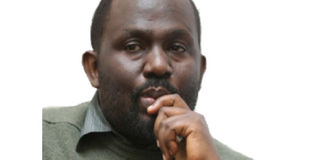This corrupt, ‘collapsing State’ of Uganda…how come it doesn’t die?

CHARLES ONYANGO-OBBO
A few days ago, the colourful-tongued East African Legislative Assembly (EALA) legislator Mukasa Mbidde, was at it again. In a TV talkshow, he said: “Can you name one single public institution that doesn’t require urgent investigation and overhaul in Uganda? If you do, then we should hand the collapsing State to that institution to manage”. Dramatic. At about the same time Mbidde was serving up his volleys, the Tony Elumelu Foundation (TEF), released the list of 1,000 African entrepreneurs from across Africa that the programme will support this year.
The foundation said, “more than 151,000 Africans from 114 countries worldwide applied to join the 4th cycle of The Tony Elumelu Foundation’s 10-year, $100 million Entrepreneurship Programme.” Its release and news reports noted, “Nigeria, Uganda and Kenya have dominated the list with 258, 126 and 74 successful candidates respectively. A similar trend was seen last year where the three countries dominated in the same order”.
That Uganda is the second largest cohort does not “flow naturally” from the common facts. We do not have the second best business schools or universities in Africa; our public education isn’t the second best (in fact recently, President Yoweri Museveni was quoted as saying Universal Primary Education had become such a shamble, anyone who could afford should send their children to private schools and leave it to the poor); we do not have an enterprise or start-up fund; we have nothing that on the face of it, would place Ugandan candidates in such an advantageous position. Until you look closely, and think twice.
Mbidde might want to go back to a revealing statement President Museveni made nearly 20 years ago. Like today, contractors and suppliers to the government hadn’t been paid, and they were going out of business in record numbers.
At a press conference, the president said he felt their pain and hectored the Ministry of Finance to urgently deal with the payments. Then he added a rider. He wondered why people did business with his government.
He himself, he said, wouldn’t do business with it! Mbidde, therefore, was asking for what, in many ways, is impossible. And Museveni was speaking to the same reality nearly 20 years earlier, though he saw it as a problem rooted in bureaucratic malaise and corruption.
Uganda desperately needs an effective and honest government that builds dams, standard gauge railways, expressways, and provides public goods on time and on budget. At the same time, there is something in the DNA of the country that is opposed to centralisation.
This is one of the reasons why Uganda was a British “protectorate”, not an old school “colonial possession”. The most successful (productive) centralisation and State-building phases Uganda has ever seen, occurred during Milton Obote and Uganda People’s Congress (UPC) rule between independence and the coup of 1971. The bulk of the country’s infrastructure, and the hard backbone of its economy, was built or laid down between the colonial period, and significantly in the eight years of Obote 1.
The UPC was largely a party of the marginalised areas of Uganda, and disefrachised and nationalist constituencies in the south.
Coming from the north as he did, Obote also had a more sophisticated centralising mindset, that understood how to bring the neglected parts of the country to the table in Kampala so they could partake of the fruits of independence. His socialist-lite ‘Move to the Left’ was part of that. After him, the militarism that characterised his second rule, and that has been heightened during Museveni’s era, are really projects in continuing centralisation.
For Museveni though, the wrinkle is that he has also unleashed counter-centralisation forces through liberalisation and privatisation of the economy. However, the vast private education system, which took off in a big way in 1988, is now producing its second crop of the “Pure Private Student” – ie kids who went to private nursery school, private primary school, private secondary and high school, and private university, without for a minute having set foot in a taxpayer-funded educational institute. Before 1986, that was impossible.
Parents’ private money, and the sprawling private education apparatus have accumulated a large knowledge resource outside the public sector, and because they need to make a return on the investment, seems we have reached a point where, emotionally and for practical reasons, they have become mostly focused on finding yields outside the patronage and corruption-riddled public sector.
That partly explains the seeming discord Mbidde speaks of, a public sector that “require[s] urgent investigation and overhaul” and a “collapsing State”, at a time when a pan-African enterprise programme receives applications from “more than 151,000 Africans from 114 countries worldwide”, and Uganda provides the second highest number of successful applicants.
Mr Onyango-Obbo is the publisher of Africa visualiser Africapedia.com and explainer site Roguechiefs.com. Twitter@cobbo3




